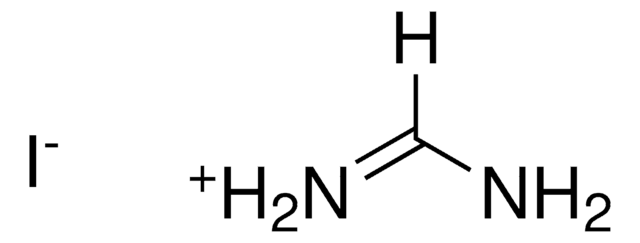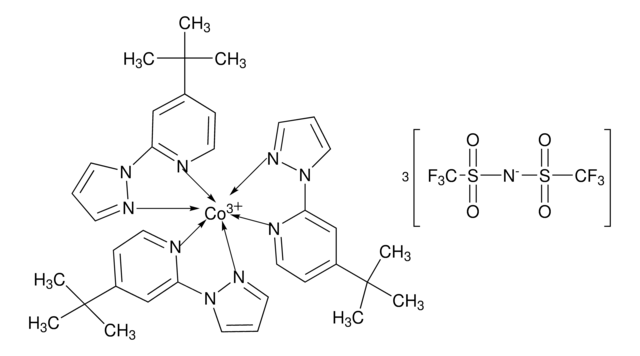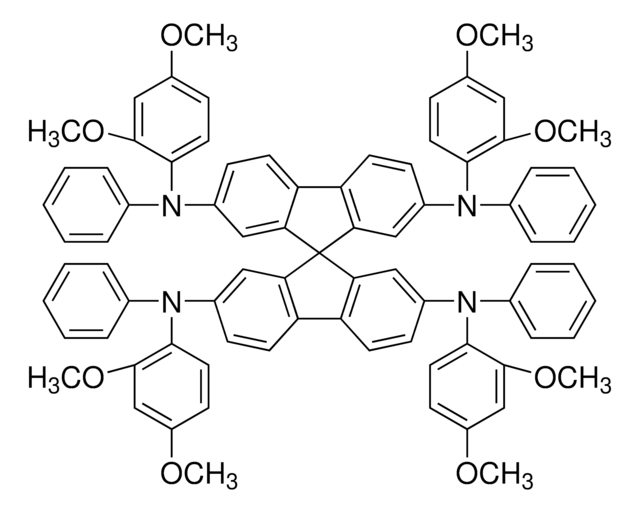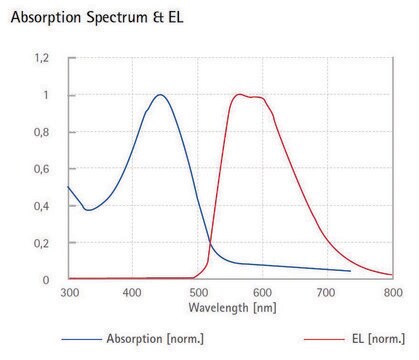902500
SHT-263 Solarpur®
Sinónimos:
N2,N2,N2′,N2′,N7,N7,N7′,N7′-octakis(4-methoxyphenyl)-9,9′-spirobi[9H-fluorene]-2,2′,7,7′-tetramine, Spiro-MeOTAD, Spiro-OMeTAD
About This Item
Productos recomendados
assay
≥99.9%
Quality Level
form
powder
greener alternative product characteristics
Design for Energy Efficiency
Learn more about the Principles of Green Chemistry.
sustainability
Greener Alternative Product
impurities
≤0.1% Residual solvent
mp
247 °C
greener alternative category
InChI
1S/C81H68N4O8/c1-86-65-29-9-53(10-30-65)82(54-11-31-66(87-2)32-12-54)61-25-45-73-74-46-26-62(83(55-13-33-67(88-3)34-14-55)56-15-35-68(89-4)36-16-56)50-78(74)81(77(73)49-61)79-51-63(84(57-17-37-69(90-5)38-18-57)58-19-39-70(91-6)40-20-58)27-47-75(79)76-48-28-64(52-80(76)81)85(59-21-41-71(92-7)42-22-59)60-23-43-72(93-8)44-24-60/h9-52H,1-8H3
InChI key
XDXWNHPWWKGTKO-UHFFFAOYSA-N
General description
Application
Legal Information
Storage Class
11 - Combustible Solids
wgk_germany
WGK 3
flash_point_f
Not applicable
flash_point_c
Not applicable
Elija entre una de las versiones más recientes:
Certificados de análisis (COA)
¿No ve la versión correcta?
Si necesita una versión concreta, puede buscar un certificado específico por el número de lote.
¿Ya tiene este producto?
Encuentre la documentación para los productos que ha comprado recientemente en la Biblioteca de documentos.
Los clientes también vieron
Artículos
Professor Chen (Nankai University, China) and his team explain the strategies behind their recent record-breaking organic solar cells, reaching a power conversion efficiency of 17.3%.
Contenido relacionado
Organic electronics utilizes organic conductors and semiconductors for applications in organic photovoltaics, organic light-emitting diodes, and organic field-effect transistors.
Nuestro equipo de científicos tiene experiencia en todas las áreas de investigación: Ciencias de la vida, Ciencia de los materiales, Síntesis química, Cromatografía, Analítica y muchas otras.
Póngase en contacto con el Servicio técnico


![[6,6]-Phenyl C61 butyric acid methyl ester ≥99%](/deepweb/assets/sigmaaldrich/product/structures/359/221/d990c746-0960-4c69-bf76-fe09b193824d/640/d990c746-0960-4c69-bf76-fe09b193824d.png)


![Poly[(9,9-di-n-octylfluorenyl-2,7-diyl)-alt-(benzo[2,1,3]thiadiazol-4,8-diyl)] average Mn ≤25000](/deepweb/assets/sigmaaldrich/product/structures/428/661/1c4ebb98-9d51-48c0-96c7-e556ca425aa4/640/1c4ebb98-9d51-48c0-96c7-e556ca425aa4.png)





